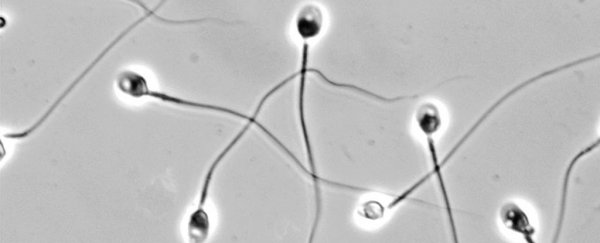Scientists are getting closer to developing a new kind of reversible male contraceptive that doesn't produce any hormonal side effects.
While a commercial drug could still be some way off, the researchers have managed to isolate a key enzyme found only in sperm. Now that they've identified it and can manufacture this enzyme, the team hopes to target it with a range of drug candidates. With the right drug, it should be possible to decrease sperm motility – their ability to swim – which could prevent sperm from egg fertilisation.
"The milestone reached is the production and isolation of a full-length, active kinase enzyme in sufficient quantities to conduct drug screens," said researcher John Herr from the University of Virginia School of Medicine. "Isolation of an active, full-length form of this enzyme allows us to test drugs that bind to the entire surface of the enzyme so that we can identify inhibitors that may exert a selective action on sperm."
The enzyme in question – called testis-specific serine/threonine kinase 2 (TSSK2) – is unique to the testes, and also appears to only be involved in the final stage of sperm production. That's important, the researchers say, because it makes it more likely that any drug candidate that successfully targets the enzyme won't produce any side effects elsewhere in the body.
"The challenge in developing a new contraceptive is that a male 'pill' will be taken by perfectly healthy men," said Herr. "Because of this fact, a male contraceptive drug should be very precise in its mechanism of action, without any off-target side effects on molecules with similar properties located in other organs."
Now that the researchers can manufacture the enzyme for themselves, it'll make it possible to screen for particular drugs that bind to 'pockets' across the surface of the kinase and (hopefully) inhibit it. While similar kinase-targeting approaches have been used in other areas of medicine – such as drugs that fight leukaemia – it's a new frontier as far as contraception is concerned.
"So far there are no kinase drugs in use in contraceptive research, so this will be one of the first efforts to identify a drug inhibiting testes-specific kinase function," said researcher Jagathpala Shetty.
But while the team's approach is one of a kind, the search for a non-hormone-based and reversible male contraceptive is not. Another product called Vasalgel offers a different method to control men's fertility, and its developers say it could be available as early as 2018.
Unlike the enzyme TSSK2, which directly affects sperms' ability to swim, Vasalgel works to hinder sperm by a different route. The soft gel, which has recently been tested in rabbits, is injected into the vas deferens – the tube sperm travels down – and blocks sperm from passing through it, much like a filter.
From the sounds of it, Vasalgel is much closer to market than any potential medications that could safely inhibit TSSK2, but the good news is it seems we're finally getting closer to a reversible, non-hormonal contraceptive for men (that isn't condoms).
Watch this space.
